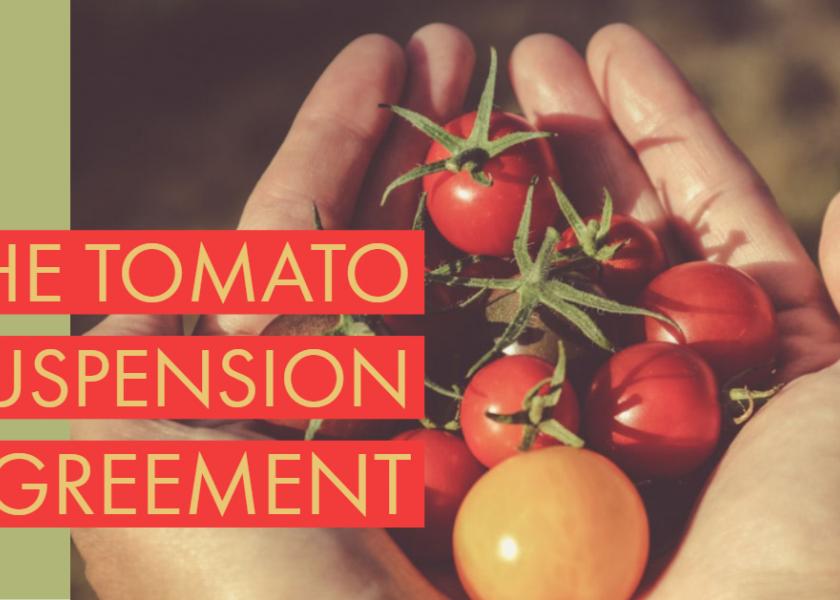Industry groups voice displeasure over tomato trade disruption

There are mixed views on the Commerce Department decision to withdraw from the 2013 Suspension Agreement on Fresh Tomatoes from Mexico, but industry leaders say a new deal is still possible.
With new duties on Mexican tomatoes entering the U.S., multiple industry groups said negotiations between the Department of Commerce and Mexico’s tomato industry must continue.
The Department of Commerce on May 7 terminated the 2013 Suspension Agreement on Fresh Tomatoes from Mexico, setting a 17.56% duty on imported Mexican tomatoes.
While most industry groups were not happy that the Commerce Department terminated the agreement, the Florida Tomato Exchange supports the move.
A statement from the exchange said the suspension agreement “presided over a very difficult five-year period for the U.S. tomato industry.”
“Although the agreement was created with good intentions, it was never effective in protecting American producers from dumped Mexican tomatoes,” according to the statement. “As a result, the U.S. industry has declined significantly over the last five years with many tomato growers across the country going out of business.”
The Florida group said negotiations for a new suspension agreement can still continue even as an antidumping investigation is resumed this month.
“The U.S. tomato industry remains open to a new suspension agreement so long as it is structured in a way that eliminates the loopholes of the previous agreement and has strong enforcement mechanisms,” the Florida Tomato Exchange said. “If a new agreement cannot be reached, we look forward to the antidumping investigation finally running its full course.”
Disappointment in Commerce Department decision
“We are disappointed that the Department of Commerce did not work more aggressively with both parties to come to an agreement that would have prevented this unfortunate action,” according to a statement from United Fresh Produce Association president and CEO Tom Stenzel. “It’s simply poor public policy to reinstate punitive tariffs from a preliminary 1996 determination from more than 20 years ago.”
Stenzel said that consumers would be better served by a new agreement that ensures a “fair, reliable and cost-effective supply” of fresh tomatoes.
“We urge the Department of Commerce and the interested parties to re-engage in urgent negotiations to reach a fair settlement,” Stenzel said.
The Produce Marketing Association’s statement said uncertainty has been added to U.S.-Mexico trade relations.
“Trade is critical for the produce and floral industry, as the buying and selling of these products — including tomatoes — occurs in a global marketplace,” according to the statement. “The impact of the previous agreement for U.S. consumers has been year-round availability of fresh produce at an affordable price. We understand that there are different perspectives on the success of the suspension agreement on tomatoes among market participants.
“What everyone should be able to agree upon is the need for transparency and predictability,” the PMA statement said. “We urge the U.S. Department of Commerce and representatives of the Mexican government to expedite their discussions and come to an agreement that works for the industry in both countries.”
The Fresh Produce Association of the Americas said the agreement has been an important tool in protecting more than 33,000 American jobs.
The FPAA praised the efforts of many to work for a new or revised tomato suspension agreement, including politicians and industry leaders.
“It is our understanding that the Mexican growers put several proposals on the table to improve an already-effective agreement,” according to an FPAA statement. “Despite the fact that the agreement has been terminated, our hope is that Commerce continues to work in good faith with the growers in Mexico to negotiate a new agreement that balances concerns of growers in Florida with the need to protect our robust trading relationship.”
The Border Trade Alliance said the end of the suspension agreement “hits shoppers in the wallet.” Its statement said that researchers at Arizona State University have determined that prices for imported tomatoes could rise as much as 85% as a result of the duty on Mexican fresh tomatoes.
“We believe that productive conversations between the Department of Commerce and Mexico tomato growers could have continued without a total withdrawal from the agreement,” according to the alliance. “We take the Department at its word that negotiations over a possible revised agreement will continue. They must continue with urgency, or we risk inflicting lasting damage on the U.S. economy.”
Related articles
Mexican tomato agreement done, duties kick in
U.S. set to drop Mexican tomato suspension agreement
Panel urges tomato industry to be prepared for disruptions







